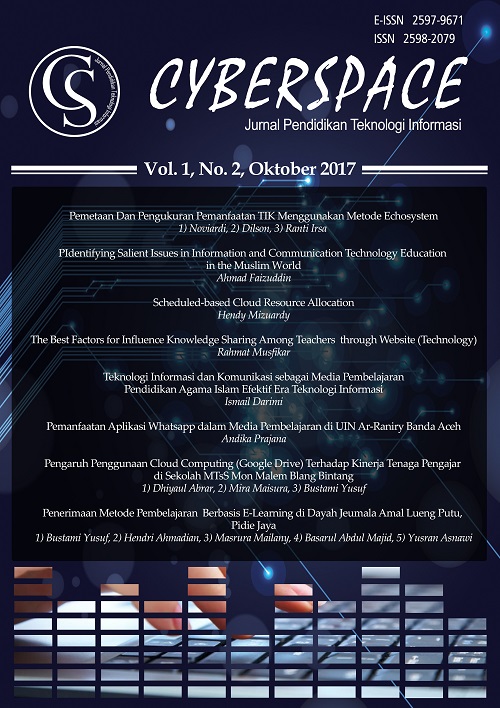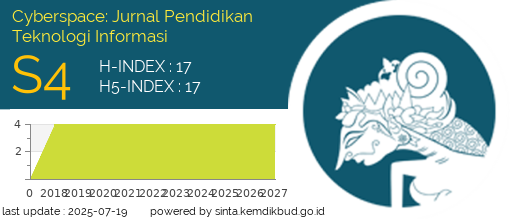THE BEST FACTORS FOR INFLUENCE KNOWLEDGE SHARING AMONG TEACHERS THROUGH WEBSITE TECHNOLOGY
DOI:
https://doi.org/10.22373/cs.v1i2.2028Keywords:
Knowledge Sharing, Total Quality Management, Web TechnologyAbstract
The purpose of this research is to answer the question and know the problems of implementation the knowledge sharing in an educational organization, that is in the school. This paper is will be explain the the best factors for implementation of knowledge sharing among teachers through website technology. this paper using research methods is study literature review. This researcher is using some previous research, using theoretical frameworks model and using existing research into knowledge management, the model has been constructed by combining, synthesizing and refactoring the factors, which have the most important effects in knowledge sharing using web technologies for the teacher. Knowledge Sharing and Total Quality Management, Enabler in the Knowledge Sharing Process, Investigation of Knowledge Sharing for Teachers, Knowledge Sharing Technology Model, Knowledge Sharing through ICT for Teachers, and Investigating Factors for Knowledge Sharing Using Web Technologies. This research is propose the best factor for successful implementation knowledge sharing among teacher are Task and Policy of Ministry of Education, individual, organization and technologyReferences
Admin Fisip Unair.(2009). Pemimpin Harus Ciptakan Knowledge Sharing Culture.Indonesia : Universitas Airlangga. Access on October 29, 2013. http://www.fisip.unair.ac.id/index.php?option=com_content&view=article&id=122%3Apemimpin-harus-ciptakan-knowledge-sharing-culture&catid=1%3Alatest&Itemid=118.
Xiaohui.(2008). Improving teachers’ knowledge management with Blog platform. Inner Mongolia : Chifeng University.
A. Tiwana, The Knowledge Management Toolkit: Orchestrating IT, Strategy and Knowledge Platform. New Jersey: Prentice-Hall Inc., 2000.
Becerra-Fernandez and R. Sabherwal, Knowledge Management Systems and Processes. London: M. E. Sharpe, Inc., 2010.
Liying Yu and Jianmei Zhao.(2010). Knowledge Management Strategy Under the Condition of E-Business. Beijing : Beijing Jiaotong University.
M.J. Zaki, S. Parthasarathy, and M. Ogiharam, “Parallel algorithms for discovery of association rules[J]â€, Data Mining and Knowledge Discovery,Vol. 1, 1997: 5–35.
Yuexin, Li and Ling, Zhang. The Knowledge Sharing Models of Knowledge Management Implemented with Multi-Agents.China: Hubei University.
E. M. Awad and H. M. Ghaziri, Knowledge Management (1" ed.). New Jersey: Pearson Education, Inc., 2004.
J. L. Y. Chu, U. C. Eze2, and G. G. G. Goh. Knowledge Sharing and Total Quality Management: A Conceptual Framework.Malaysia : Multimedia University.
Van den Hooff B. & A de Ridder J. (2004). Knowledge sharing in context: the influence of organizational commitment, communication climate and CMC use on knowledge sharing. Journal of Knowledge Management. 8 (6), 117- 130.
Shu Hui Wee.(2012). Important Enabler in the Knowledge Sharing Process: Top Management Support.Malaysia : Faculty of Accountancy & Accounty Research Institute.
Yang 1. (2007). The impact of knowledge sharing on organizational learning and effectiveness. Journal ofKnowledge Management. 11(2) 83-90.
Tao li, Lifeng Hou, and Wei Hu.(2011). An Investigation of Knowledge Sharing on Campus among Teachers. Xuzhou : Air Force College.
Lin H.F (2007). Knowledge sharing and firm innovation capability: an empirical study. International Journal ofManpower. 28 (3/4) 315 - 332.
Cheng J.H, Yeh C.H. & Tu C.W. (2008). Trust and knowledge sharing in green supply chain. Supply Chain Management: An international Journal. 13(4) 283-295.
Everd J. & Gert R. (2007). The development of a knowledge sharing construct to predict turnover intentions. Aslib Proceedings: New Information Perspectives. 59 (3) 229-248.
Serenko A., Bontis N. & Hardie T. (2007). Organizational size and knowledge flow: a proposed theoretical link. Journal of Intellectual Capital. 8(4) 610-627.
Srivastava A., Bartol K.M & Locke E.A. (2006). Empowering leadership in management teams: effects on knowledge sharing, efficacy and performance. Academy ofManagement Journal. 49 (6),1239-1251.
Endres M.L., Endres S.P., Chowdhury S.K. & Alam 1. (2007). Tacit knowledge sharing, self-efficacy theory and application to the Open Source community. Journal ofKnowledge Management. 11(3) 92-103.
Akhavan P., Jafari M. and Fathian M. (2006). Critical success factors of knowledge management systems: a multi-case analysis. European Business Review. 18(2) 97-113.
Connelly C.E. & Kelloway E.K. (2003). Predictors of employees' perceptions of knowledge sharing cultures. Leadership & Organization Development Journal. 24(5) 294-301.
O'Neill B.S. & Adya M. (2007). Knowledge sharing and the psychological contract. Managing knowledge workers across different stages of employment. Journal ofManagerial Psychology. 22(4) 411436.
Fadillah Yassin, Noraidah Sahara, and Juhana Salim.(2011). A Framework of Knowledge Sharing through ICT for Teachers in Malaysia. Bengi : Faculty of Information Science and Technology.
Life Hanan Alotaibi, Richard Crowder, and Gary Wills.(2013). Investigating Factors for Knowledge Sharing Using Web Technologies. United Kingdom : University of Southampton.
Puniyamoorthy, M. & R.Murali (2008). Balanced score for the balanced scorecard: a benchmarking tool. Benchmarking: an International Journal. 15(4) 420-443
R. Elsdon, Affiliation in the Workplace: Value Creation in the New Organization. United States of America: Praeger Publishers, 2003
Downloads
Published
Issue
Section
License
Authors who publish with Cyberspace Journal agree to the following terms:
- Authors retain copyright and grant the journal right of first publication with the work simultaneously licensed under a Creative Commons Attribution License that allows others to share the work with an acknowledgement of the work's authorship and initial publication in this journal.
- Authors are able to enter into separate, additional contractual arrangements for the non-exclusive distribution of the journal's published version of the work (e.g., post it to an institutional repository or publish it in a book), with an acknowledgement of its initial publication in this journal.
- Authors are permitted and encouraged to post their work online (e.g., in institutional repositories or on their website) prior to and during the submission process, as it can lead to productive exchanges, as well as earlier and greater citation of published work (See The Effect of Open Access).



















